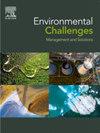理解混合海防方法对海岸恢复力的挑战和机遇的进展
Q2 Environmental Science
引用次数: 0
摘要
随着全球气候变化的加剧和海平面的上升,海岸侵蚀和洪水的风险持续加剧,对沿海地区的可持续发展和管理提出了重大挑战。气候变化也对沿海生态系统产生不利影响,使其难以适应不断变化的环境条件。近年来,人们越来越重视沿海栖息地的气候适应措施,特别是实施可持续的方法来减轻沿海灾害和保护生态系统。在这种情况下,结合传统和自然解决方案的混合海防方法提供了创新和通用的战略,以增强沿海地区的复原力并减少脆弱性。虽然以前的研究主要集中在基于自然和混合工程解决方案的生态效益上,但关于这些海防的波浪结构相互作用的数据和证据仍然缺乏。本研究通过系统地回顾95篇论文,全面讨论了混合海防的主要功能、局限性和研究方法,以及有效实施这些创新方法的技术和社会障碍,并提出了潜在的解决方案和未来的研究兴趣,以克服有效整合这些方法的问题。混合海防系统比基于自然的解决方案更坚固,同时在许多情况下比硬海防系统更环保。然而,由于缺乏准确和明确的定量证据,混合海防的数量是值得怀疑的。本文旨在帮助沿海管理者、工程师、研究人员和政策制定者更好地了解混合工程在气候变化和极端气候事件下创建可持续沿海城市中的应用和性能。本文章由计算机程序翻译,如有差异,请以英文原文为准。

Advances in understanding the challenges and opportunities of hybrid sea defence approaches for coastal resilience
The intensification of global climate change and rising sea levels continue to exacerbate risks of coastal erosion and flooding, presenting significant challenges for coastal regions' sustainable development and management. Climate change also adversely affects coastal ecosystems, which struggle to adapt to evolving environmental conditions. In recent years, there has been a growing emphasis on climate adaptation measures for coastal habitats, particularly implementing sustainable methods to mitigate coastal hazards and protect ecosystems. In this context, hybrid sea defence approaches, combining conventional and natural solutions, offer innovative and versatile strategies to enhance resilience and reduce the vulnerability of coastal areas. While previous studies have predominantly focussed on the ecological benefits of nature-based and hybrid-engineering solutions, there remains a scarcity of data and evidence regarding wave-structure interactions at these sea defences. This study comprehensively discusses the main functions, limitations and research methods of hybrid sea defences and technical and social barriers to effectively implementing these innovative approaches by systematically reviewing 95 papers and suggesting potential solutions and future research interests to overcome the problems of incorporating these approaches effectively. Hybrid sea defences offer greater robustness than nature-based solutions while performing more environmentally friendly than hard sea defences in many cases. However, the population of hybrid sea defences is questionable because of the lack of accurate and clearly quantitative evidence. This paper aims to provide coastal managers, engineers, researchers, and policymakers with a better understanding of the applications and performance of hybrid engineering in creating sustainable coastal cities in the face of climate change and extreme climatic events.
求助全文
通过发布文献求助,成功后即可免费获取论文全文。
去求助
来源期刊

Environmental Challenges
Environmental Science-Environmental Engineering
CiteScore
8.00
自引率
0.00%
发文量
249
审稿时长
8 weeks
 求助内容:
求助内容: 应助结果提醒方式:
应助结果提醒方式:


